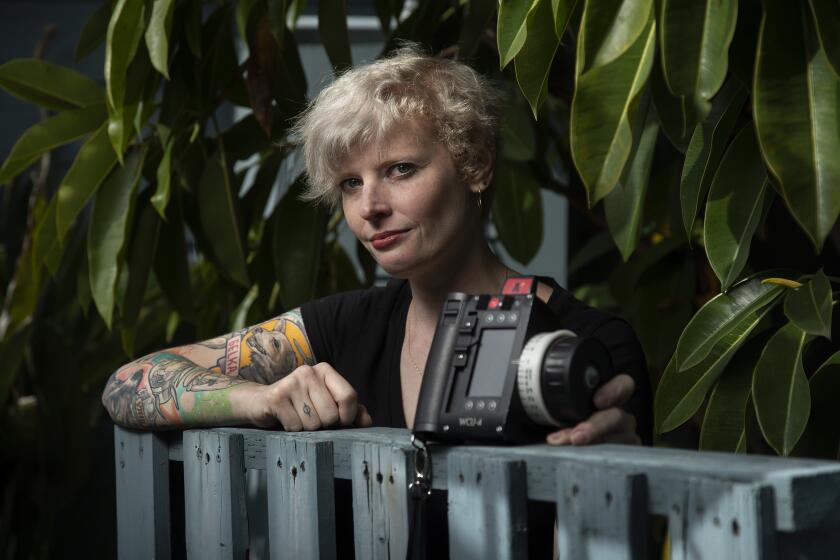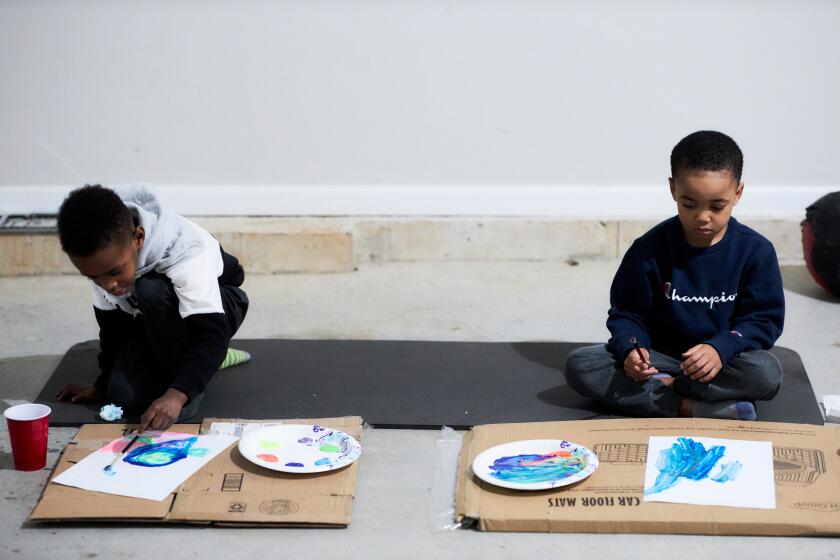TV pros are getting creative, using tech to keep your shows afloat amid coronavirus
- Share via
Hollywood is an industry built on the work-around. Can’t actually shoot a woman tied to the railroad tracks, a guy climbing Mt. Rushmore, a kid playing Quidditch? Then build a set, paint a backdrop, use greenscreen technology. The actor is too old, too young, too bald — or pregnant? Meet the make-up, hair and costume departments.
So it’s not surprising that even before COVID-19 formally shut down film and television productions (on Friday, March 13, not that anyone in Hollywood is superstitious), the industry was scrambling to figure out how to keep working, together but separately, to ensure that production can resume the moment safety concerns allow.
For the record:
12:31 p.m. April 21, 2020An earlier version of this story incorrectly stated that “The People’s Couch” was canceled after one season. The series ran for four seasons.
Especially TV: Any frustration about the wild overabundance of content has turned to list-making gratitude as shelter-at-home orders proliferated and lengthened; and while production stopped, creation has not. Studio equipment was sent to people’s homes, security protocols were loosened, computer systems were shored up and everyone, obviously, downloaded Zoom. (Dr. Patrick Soon-Shiong, owner of The Times, is an investor in the video conferencing company.)
Alena Smith was lucky. The showrunner and her team were in the final steps of postproduction on Season 2 of the Apple TV + hit “Dickinson.”
“All of our editing was done and we had locked picture,” she said. “We still had to do color correction, some of the VFX, the score and the final sound mix.”
Three weeks into shutdown, only sound mixing remained. The postproduction house Smith uses was closed, she said, “but one of the guys who works there has a stage in his house in Connecticut. He doesn’t usually work on the show but he is now.”
The coronavirus crisis has provided an unwelcome lesson in the hidden perils of working in the kind of high-touch environments required of movie and TV production.
Smith and her family were sheltering in New York state, at her parents’ house, where, at the time of this interview, Apple was sending a high-power sound bar and a Blu-ray. What would normally take two or three days in a studio will take two or three weeks — “it can take three days just to do all the uploading and downloading” — but it will get done.
“It is ironic that we’re doing a show about Emily Dickinson and her need for human connection while [we’re] sheltering at home,” she said. “It’s good to know we can do more things remotely than we thought we could, but I don’t think anyone would choose to do it this way again.”
“Home Before Dark,” another Apple TV+ show, had a very different experience, timing-wise. Dana Fox’s drama about a dogged girl reporter (based on real life girl reporter Hilde Lysiak and played by “The Florida Project’s” Brooklynn Prince) who shakes up a small town, premiered during the corona-crisis and was shooting the fourth episode of its second season when it shut down.
“It’s actually a great time to debut a show,” Fox said, “because everyone is watching TV. And as long as the Internet holds, we’re all just Zooming.”
Hilde Lysiak, the young journalist at the center of Apple TV+’s “Home Before Dark,” interviews its star, “The Florida Project” actress Brooklynn Prince.
Fox had an online celebration a few hours before the first episode dropped with the cast and some crew, including executive producer Jon M. Chu (“Crazy Rich Asians”), who directed two episodes. Then, to Fox’s surprise, her family hosted an online premiere, complete with a red carpet made out of construction paper for her to walk in their home.
“We couldn’t have everyone but there were like 60 people [online],” said Chu, who has been busy developing projects while reassuring the world that his movie version of “In the Heights” will be seen on the big screen as soon as big screens are again available. He wasn’t slated to direct any episodes in the second season of “Home Before Dark” because of work conflicts.
“Now, who knows? If one of the other directors has to step away, I might,” he said.
That could be a silver lining in a particularly precarious situation. Beyond finishing the scripts for Season 2, and plotting to ask Apple to greenlight Season 3 so she can work on that as well, there isn’t much production work that Fox can do. And when your leading lady, and many of her supporting players, are aged in the single digits (Prince is 9), appearance continuity can be an issue even without a gap of unknown duration.
“We had to do some extra shoots after Season 1 was done,” Fox says, “and when I saw them I thought ‘Oh, my God, she’s grown up so much.’ I am just praying for no huge growth spurt.”
For Katie Wech (“Rizzoli & Isles,” “Jane the Virgin”) the shutdown came in stages. In February, she was in Vancouver, Canada, prepping for the CBS medical drama pilot “Good Sam.” It soon became clear that actual hospital locations were not going to be available and other locations were also either balking or shutting down.
“Our hero [main] location was at a university and when that closed, we had to call an audible,” she said. “CBS wasn’t saying anything yet, but then we heard that all production was shutting down. On Friday the 13th,” she added, laughing, “with a full moon and Mercury in retrograde. So something was definitely up.”
As Wech packed, the situation felt surreal. “My husband was sending me pictures of bare shelves in Gelson’s, but people in Vancouver were still partying in the hotel lounge, eating peanuts out of bowls on the bar.”
She stocked up on Clorox wipes and Purell, still plentiful in Vancouver, and flew home to L.A. where she is sheltering with her family, which includes three young children.
“Fortunately for me, CBS called and ordered another episode, so I’m working on that,” she said. “I don’t know if they are trying to stockpile scripts but for me, it’s great to have the chance to dig further into this show — when I don’t have someone pulling at my pants or demanding that I order pad Thai.”
Her children are all finishing the school year online, but as every parent knows, that still leaves a lot of hours in the day. “I have all these Post-its on the wall. My 8-year-old saw me staring at them and asked what they were for and I told her they help me figure out story. ‘Hmm,’ she says. ‘Let me take a look.’ So that’s where we are now.”
We asked parents across the country how they’re managing the new job of educating their kids. These are the tricks they rely on.
Producer Jessica Rhoades had three shows — “Station 11,” Gillian Flynn’s “Utopia” and “Dirty John: The Betty Broderick Story” — in production or post and was opening a writers room on a fourth project when the shutdown hit.
“Putting together a writers room remotely is doable but different,” she said. “A lot of rooms are working remotely but they are established, they have their tone and cadence.”
“Station 11” was already scheduled to have a hiatus, Rhoades said, “so now it will just be a bit longer.” She has been involved in the remote postproduction on “Utopia” and “Dirty John” and is surprised at how well it is going.
“Somehow we never had strong enough technology to do this much work remotely,” she said, “and now we do.”
Like Fox and Smith, Rhoades is very concerned for below-the-line workers who cannot, by the nature of their jobs, work when production is shut down (Fox is part of the “It Takes Our Village” campaign). She also feels for anyone who, when pilot season came to an abrupt halt, was in the midst of shooting their first pilot.
“You work so hard to get that break,” she said. “We all want to believe we will be able to make those shows, but no one knows.”
No matter when the shutdown ends, there will be an unavoidable dip in new content as shows interrupted mid- or preproduction play catch-up. That gap, Rhoades said, will no doubt be filled by an explosion of unscripted shows similar to that which followed the writers strike 12 years ago. (The dearth of scripted content following the strike led to, among other things, the resurrection of Donald Trump as a reality host; in 2007, low ratings had sidelined “The Apprentice” but in the scramble for content, “The Celebrity Apprentice” was born.)
“Reality shows are very postproduction-heavy,” said Rhett Bachner, who with partner Brien Meagher developed “Shark Tank” and other programming before founding B17 Entertainment, which produces reality content for multiple platforms including Quibi, HBO Max and SyFy.
The disruption of pilot season, which some industry vets predict may never be the same, underscores the rippling economic effects of the health crisis.
“We already had editors able to work remotely,” added Meagher, “and we were able to expand our remote capabilities.”
“There were quite a few projects that we were set up to begin that we could not film,” said Bachner, “but we are editing all the things we had filmed at the end of last year, and we’re developing ways we can shoot remotely.”
“From a nonscripted standpoint, it’s a great opportunity,” said Meagher. ”There will be holes to fill this summer and even this fall.”
Like Bachner and Meagher, Stephen Lambert, a London-based producer who has launched reality shows in the U.K. and the U.S., including “Wife Swap,” “The Secret Millionaire” and “Undercover Boss,” is as busy as ever. Busier.
“You can carry on editing, you can carry on casting and you can plan everything. We are doing a lot of pitching. Everything takes a bit longer, and you’re doing a lot of FaceTime with people who aren’t shaving regularly.”
In some cases, Lambert said, even shooting has continued and at least one of his shows, “Gogglebox,” has seen a huge coronavirus-related boost.
“Gogglebox,” which is not, alas, available in the U.S., features an array of family and friend groups reacting as they watch television — scripted, unscripted and news programs — in their homes. For 15 seasons, it has captivated audiences, made its participants into celebrities and spawned multiple knockoffs, including a short-lived U.S. version. Last Year, the New Yorker described it as “a chronicle of Brexit fatigue.”
Because the cameras are already installed in the cast members’ homes, the program has been able to proceed throughout — and capture their reaction to — the COVID-19 crisis. When cast member Izzi Warner broke down over her fears on a recent episode, fans rallied in support and gratitude, saying she spoke for millions.
While there has been some concern about the lack of social distancing the show requires, Channel 4 recently reassured viewers that most cast members live with each other and are observing self-isolation rules. So “Gogglebox” will continue, its lively and diverse cast capturing the ever-shifting zeitgeist — recent episodes have included reactions to “Tiger King” and Boris Johnson’s hospitalization — and chronicling this unprecedented moment in history.
Lambert, meanwhile, is trying to figure out a way to bring “Gogglebox” back to the U.S. “The People’s Couch,” an American version that ran on Bravo for four seasons, ended in 2016. Perhaps the months that Americans have spent in lockdown, warming their hands at the electronic hearth, will make the next attempt more successful. That would be the ultimate COVID-19 workaround, and a small silver lining.
More to Read
The biggest entertainment stories
Get our big stories about Hollywood, film, television, music, arts, culture and more right in your inbox as soon as they publish.
You may occasionally receive promotional content from the Los Angeles Times.













